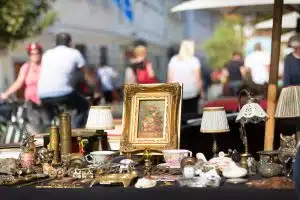
However, starting a business of any kind requires careful planning, research and investment, and the antique dealing industry is no different. It is essential to have a clear understanding of the market, the competition and the legal requirements for operating a business in the UK.
Antiques is a business venture quite unlike any other. For all the information you need on starting and running an antiques business, have a read through the following guide.
Research your target market
If you’re planning to start your own antique business, it’s important that you research your market. Find out if there is a demand for your products and how well they are being met in the current market.
Estimating demand
Based on the number of customers you hope to attract, you’ll need to estimate how many pieces you will sell in the year. You may only need to sell a few pieces every month if your stock is extremely expensive. In order to generate enough income, you will need to sell many more items per month if you plan to stock modestly priced bric-a-brac and collectibles.
They usually sell most of their stock to other antique dealers and members of the public who are familiar with their particular type of antique. There are times when items are purchased specifically for a specific customer.
There is a rise and fall in the demand for antiques as fashions and trends change. Many antique collectors and dealers keep up with the market by using Antique Collecting, an industry journal. Your stock may need to reflect current trends in demand, so make sure it reflects them.
As part of your market research, you might try taking a stall at an antiques fair or market. In this way, you’ll have a better idea of what type of pieces are in demand and what prices customers are willing to pay for them.
Competition
A well-known antique district that attracts hundreds of dealers and amateur collectors is a great place for this type of business. Since each item is virtually unique, customers will visit every outlet to see what is available so they can determine which outlet has the item they are looking for.
Displaying ‘fresh’ pieces in a welcoming environment is a great way to attract custom. It is important to ensure your antique shop stands out and is memorable enough for people to return despite the existence of other antique shops in your vicinity.
Find out which antique dealers in your area target certain markets, what their prices are, when they are open, etc. As a result, you can decide what kind of products you will sell and how you will differentiate your store from the rest.
Trade sales
There is a good chance that your stock may be called upon from time-to-time by other antique dealers, who sell a lot of their stock to other dealers. Offering regular stock to other dealers in the same line of antiques would be a good idea if you specialise in a particular type.
Establish your customer profile
Retail businesses may have a variety of customers, including:
- Private individuals, including enthusiasts and amateur collectors
- Other dealers
- Corporate investors and collectors
- Interior designers
- Businesses such as hotels, restaurants or pubs
- Museums and galleries
There may be some overseas customers for your business.
The trade may be the only market you want to target for your sales – such as operating as a ‘runner’. The runner essentially buys stock and then offers it to other dealers. They do not typically have their own premises. Most dealers have warehousing facilities since they supply container loads of antiques overseas to customers in countries like China, Japan, and the US.
If you can establish a reputation for fresh, high-quality pieces, many of your customers will become regulars.
Discounts
Customers expect that an item can be negotiated down from its marked price, which is an accepted practice in the antiques trade.
It is important to keep in mind that a vendor’s commission will be due on each sale if you plan to sell a lot of stock at auction.
Advertising your business
Regardless of who your customers are, making sure they know who you are is essential. You will benefit from a stream of visitors if you are able to locate in an area where other dealers are already located. Having a well-presented stock range is what will attract these visitors to your shop. After they have entered your door, welcome them with a friendly welcome and provide them with some printed material they can take home.
Promoting your business can be accomplished in a number of ways:
- Place ads in your local newspaper and other local publications and directories
- Send out a newsletter to antique collectors and specialists
- Offer mail order services and have your own website
- Share new pieces on social media, such as Instagram
- Print leaflets describing your inventory and leave some with local hotels
- Attend antiques markets and fairs
- Ensure that your vehicle, stationery, and literature reflect the name of your business
What to sell
You will probably decide what items to stock based on:
- Your own areas of interest and expertise
- The sector of the market you want to target
- Current trends in demand
- Where you will be located
- How much space you have
If you want to appeal to as many customers as possible, you might choose to specialise in any one of the following, or you might stock a bit of everything. A wide range of stock is often carried by dealers outside London.
Items might be stocked in the following categories:
- Furniture – a wide variety is available, with some dealers specialising in country and farmhouse furniture, others in Georgian pieces, etc.
- Textiles and carpets, tapestries and needlework
- Paintings, drawings, prints
- Sculptures
- Clocks (including grandfather clocks) and barometers
- Ceramics, glass, decorative objects, metalwork
- Stamps, coins and medals
- Jewellery, silver, old Sheffield plate
- Oriental art
- Collectibles, toys, and curios
- Guns, weaponry and militaria
- Musical instruments
- Other specialist items, such as antique fishing tackle
- Antiquities and relics
- ‘Retro’ and vintage items, but not necessarily antiques
Depending on your interests, you may decide to specialise in a particular style, school or era.
There are a few exceptions to the UK’s ban on ivory sales in the future.
A house clearance can lead to many non-antique items to be disposed of – you could set aside a bargain corner for the better items and sell others to second-hand dealers.
Among the services you may offer are repairs and restoration, valuations, paint stripping, re-upholstery, etc. Perhaps you will perform appraisals and valuations. It is possible that some of your customers will be interested in reproduction items that can be ordered from a catalogue. In order to increase their appeal and give them a new lease on life, you may decide to ‘upcycle’ low-value items. You may intend to create and sell traditional items out of antiques and reclaimed materials made with ‘recrafted’ and ‘new-old’ designs.
Displaying your stock
You should display your stock according to its nature and consider how your premises will look as a whole. It is likely that you will space out your stock if you plan to deal in highly expensive items so that potential customers can fully appreciate each piece. You might decide to cram as many pieces as possible into your premises if you intend to cater to the bric-a-brac market. Make sure fragile items are displayed in cabinets and out of harm’s way to prevent breakages. While your attention is diverted, dishonest people may pocket small items.
Adding new pieces or moving stock around to make it appear as if you have new items to sell is a great way to keep your displays looking attractive.
Several dealers now highlight new pieces on social media, such as Instagram.
It is likely that you will have to take good photos and write complete and accurate descriptions of items you intend to sell on eBay, Etsy, or Sellingantiques.co.uk, and/or through your own e-commerce website.
Selling on eBay
Reaching new customers and boosting sales can be achieved by selling online. In addition to being expensive, setting up your own online store can take time, and you may not know if the sale value will justify the cost of setting it up at the beginning.
Trading on eBay is a good way to learn about selling online without having to invest a lot of money. Even when you have your own online shop, you may decide to continue selling through eBay.
Getting started
Buying and selling items on eBay are two of the most common things that people do. You may already have your own eBay account. Business sellers on eBay must clearly specify in their listings that they are business sellers if they are trading as businesses. If you want to upgrade your personal account to a business one, you’ll need to create a new business account. If you’re unsure whether you should register as a business seller, the eBay Business Centre gives guidance on the definition of ‘trading’.
HM Revenue & Customs (HMRC) will need to know that you’re trading if you’re not already running a business and intend to start selling things on eBay. You can find guidance on notifying HMRC and other tax obligations on the Gov.uk website regarding what counts as trading and self-employment.
Decide whether to have your own virtual ‘shop’
With a virtual storefront, you can showcase all your products together and give your business a powerful online presence.
You can set up an eBay Shop when you sign up to sell on eBay. A template can be used for creating your shop or it can be customised to fit your needs. Wait until your monthly sales reach a certain level before upgrading to eBay Shop – you don’t have to choose it right away.
How much does selling eBay cost?
You should research eBay fees before you start selling on the site. If you sell a variety of items and use a variety of methods to sell them, your total fees can be quite high. Other fees you pay may not be dependent on how many items you sell each month, but rather fixed costs that you incur regardless of whether you sellanything.
Unless you’re only selling a few items per month, you’re usually better off choosing a subscription-based plan rather than selling as a business seller on eBay.
Fee illustrators and fee calculators are available on eBay to help you compare different selling methods and estimate what your actual selling fees will be per item.
Managing your listings
If you plan to sell a large number of items, uploading your inventory and managing your listings can be time-consuming.
You can streamline this process by using eBay’s listing tools, some of which are free and others will cost you money.
Promoting your items
It is very important that you do everything you can to stand out from the crowd on eBay because there are so many items for sale at any one time.
Ensure that your descriptions are accurate and spell-checked, and your photos and other images reflect as well as possible the items you’re selling.
In addition to search engine optimisation, you might want to use eBay’s cross-promotional tools and other marketing tools.
Your reputation
eBay sellers need to be aware of the importance of their online reputation. Customers check trustworthinessand reliability by checking your feedback score based on actual customer feedback.
In order to maintain a high rating, make sure your customer service is excellent, and your delivery is fast at an affordable price. Keep an eye on your stock levels to prevent your listings showing an item as in stock even when it is out of stock. Respond to customer questions promptly, handle returns promptly, and keep your return policy up to date.
Getting orders ready and shipping them can take some time but staying on top of the job will ensure that the right items get delivered in good time to the right people. You can now easily arrange and track deliveries using very many parcel delivery services that integrate with your eBay account.
More information
Getting started as a business seller on eBay is very easy, and you can expand your business as the demand for your products increases. Experienced sellers often answer questions in the active seller community forum.
Buy an existing business
In lieu of starting your own antique dealer business from scratch, you might consider buying an existing one. It is possible to purchase a going concern which already has customers, regular sales, employees, premises, and equipment.
A business like an antique shop tends to be popular with ‘downshifters’ – perhaps the owner is considering a career change again after having made the wrong decision the first time around.
Make sure the seller has good title to the stock you are purchasing. An item of value should be checked for unresolved ownership disputes.
When you don’t have the right skills, experience, and legal expertise and financial knowledge on your team, buying a business can be risky and expensive. Ensure the business is in good financial and trading condition so that the price you pay is reasonable.
Conclusion
In conclusion, starting an antique dealing business in the UK can be a fulfilling and profitable endeavor, but it’s important to be aware of certain factors to ensure success. It’s crucial to have a deep understanding of the market, the competition and the legal requirements for operating a business in the UK. Additionally, it’s important to have a clear business plan, a well-defined target market, and a solid understanding of pricing and valuation.
Building a network of contacts and developing relationships with other dealers, auction houses, and collectors will also be beneficial. Finally, it’s important to be able to authenticate and appraise items accurately and to have a good understanding of the history and cultural significance of the pieces you are dealing with. With the right knowledge, planning, and passion, an antique dealing business in the UK can be a rewarding and profitable venture.
Jarred Musson is a versatile writer with a diverse educational background and a passion for all things business. Holding a Master of Science (MSc) degree in Marketing and a Bachelor of Arts (BA Hons) in Multimedia Journalism from Manchester Metropolitan University, Jarred possesses a unique blend of expertise that allows him to dissect and communicate complex business topics with clarity and precision.


